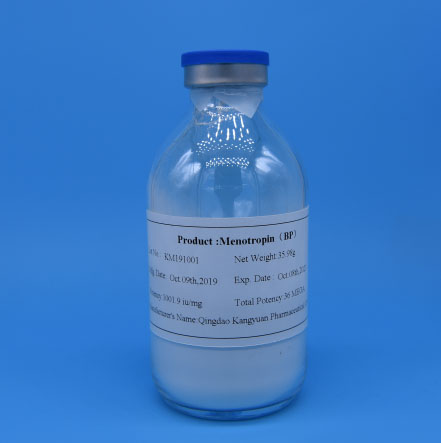Human Menopausal Gonadotropin (hMG) is a vital hormone used in fertility
treatment to assist couples who are struggling with infertility. It acts as a
catalyst for stimulating the production of eggs in women and enhances sperm
production in men. This article aims to shed light on the significance of hMG in
fertility treatment, its mechanisms, and the positive impact it has on
individuals trying to conceive.
Mechanism of action: hMG contains follicle-stimulating hormone (FSH) and
luteinizing hormone (LH) extracted from the urine of postmenopausal women. It
works by directly stimulating the ovaries in women, promoting the growth of
ovarian follicles to facilitate ovulation. In men, hMG stimulates the testes to
produce sperm, improving their quality and quantity. The balanced levels of FSH
and LH in hMG make it an effective treatment for both male and female
infertility.

Application in fertility treatment: In assisted reproductive technologies
such as in vitro fertilization (IVF) and intrauterine insemination (IUI), hMG
plays a crucial role. In IVF, hMG is administered to women in order to stimulate
the development of multiple follicles, increasing the chances of retrieving
viable eggs for fertilization. In IUI, hMG is utilized to improve sperm quality
and enhance the success rate of the insemination procedure. The precise dosage
of hMG is determined by fertility specialists based on individual needs,
ensuring optimal results.
Benefits and considerations: Using hMG in fertility treatment offers
several benefits. Firstly, it helps individuals with ovulatory disorders, such
as polycystic ovary syndrome (PCOS), by promoting regular ovulation. Secondly,
it allows for controlled ovarian hyperstimulation, which optimizes the number of
eggs produced, leading to higher success rates in IVF and IUI procedures.
Additionally, hMG treatment is often combined with other fertility drugs,
customized to address specific fertility issues. However, it is essential to
note that hMG treatment requires careful monitoring to avoid potential risks or
side effects, and should always be administered under the guidance of a
qualified fertility specialist.
Success rates and future prospects: The use of hMG in fertility treatments
has shown promising results, with a significant increase in successful
pregnancies. Its precise dosage and controlled stimulation of the ovaries and
testes have contributed to higher fertilization rates and improved embryo
quality. Ongoing advancements in reproductive medicine continue to refine hMG
treatment, making fertility procedures more effective and accessible for couples
seeking to conceive.
Human Menopausal Gonadotropin has revolutionized fertility treatment by
providing a targeted approach to address infertility concerns. Its ability to
stimulate ovulation in women and enhance sperm production in men makes it an
invaluable tool for assisted reproductive technologies. However, it is important
to understand that hMG therapy should be carefully administered and monitored by
fertility specialists. With continued research and advancements, hMG holds the
promise of bringing hope and fulfillment to couples striving to build their
families.